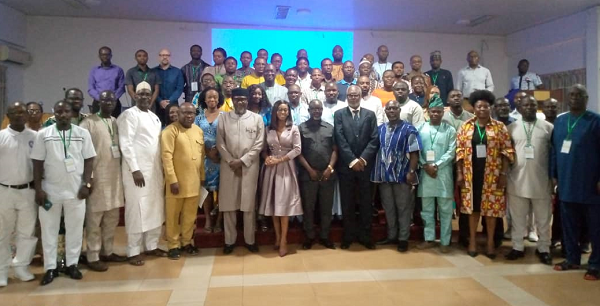Scientists and meteorological experts from Gulf of Guinea countries have released the March to June 2024 seasonal weather forecast, which indicates a higher probability of wetter conditions across most parts of the sub-region.
It also predicted late start and early ending of the rains along the southern areas of the Gulf of Guinea.
Notably, areas such as eastern Cote d’Ivoire, Ghana, Togo, Benin and western Nigeria are expected to experience late to normal starting of the rainy season this year.
For the March-April-May and April-May-June 2024 periods, the coastal part of Cote d’Ivoire, south-western part of Ghana and the south-eastern part of Liberia are expected to experience less wetter conditions.
The special seasonal forecast for the 2024 major rainy season for the Gulf of Guinea countries was announced at the end of a five-day regional climate outlook forum in Accra, which brought together scientists from the sub-region to analyse scientific data and statistical models based on the 1991-2020 climatological baseline.
The workshop — organised by the African Centre of Meteorological Applications for Development (ACMAD), in collaboration with the Regional Climate Centre For West Africa and the Sahel (AGRHYMET), the Ghana Meteorological Agency (GMet) and some technical partners — also predicted that some parts of the regions would experience long to average dry seasons.
The forum was initiated in 2014 in response to the need for information on the climate of the sub-region to better manage climate risks such as extreme weather, hydrological and climatic disasters, including severe storms, floods, heat waves and droughts, that cause loss of life and significant socio-economic impacts that affect development and growth.
Recommendations
Presenting the outlook for the sub-region, the head of the information and research department of AGRHYMET, Dr Abdou Ali, said the possibility of heavy rainfall events could lead to localised flooding.
To reduce the risk of flood-related disasters, including the loss of human lives, property, arable land and crops; water-borne diseases and pollution of water supply systems, among others, he recommended vigilance and following updates of season forecasts disseminated by the national and meteorological hydrological services.
He also called for the strengthening of monitoring and response capacities of agencies in charge of flood monitoring, disaster risk reduction and humanitarian aid.
The possibility of rainfall deficits in Cote d'Ivoire, parts of Ghana and Liberia, he said, also called for the need to increase vigilance against crop pets such as army worm, and to promote the establishment of food stocks.
He called for the strengthening of the dissemination and communication of hydro-climatic information and to raise community awareness of risk reduction.
Representing the Minister of Communications and Digitalisation, the Director of Research Statistics and Information Management, Dr Samuel Antwi-Gyekyi, stressed the critical role of accurate and timely seasonal forecasts to various sectors, ranging from agriculture and water management to disaster preparedness.
He highlighted the impact of natural phenomena such as floods, droughts, and erosion, and the need to empower communities with insights into upcoming seasons to help them to make informed decisions and to better prepare for potential challenges and opportunities.
He expressed concern over the limited access to meteorological information, with the World Meteorological Organisation indicating that around 60 per cent of Africans lacked such access.
Dr Antwi-Gyekyi urged meteorological institutions, particularly regional centres, to prioritise effective dissemination methods, referencing the "Early Warning for All" initiative launched the previous year as a crucial platform.
He expressed the Government of Ghana's commitment to build a climate-resilient economy, and its dedication to address environmental challenges.
Climate atlas
The acting Director-General of GMet, Eric Asuman, announced the agency's intention to reach out to various climatological zones in Ghana for better appreciation of the forecast's content to ensure informed decision-making.
He further unveiled the agency’s ambitious plans for 2024, including the issuance of forecasts in real-time scales, ranging from daily to weekly, sub-seasonal, and seasonal forecasts.
He said the agency planned to develop a climate Atlas, in collaboration with partners, including the Denmark Meteorological Institute, acknowledging support from global partners.
He reiterated the agency's commitment to proactive measures, including sensitisation and advocacy, to ensure accurate and timely weather information for institutions relying on GMet’s forecasts.
The Board Chairman of GMet, George Amoo, stressed the importance of fostering awareness of meteorology's role in daily life, asserting that by increasing awareness, individuals and communities could leverage weather and climate information for their well-being and prosperity.
He urged the media to play a pivotal role in disseminating the information to empower communities.
The Director-General of ACMAD, Dr Andre Kamga, urged all the national meteorological services agencies to update the outlook every month and also interact and take feedback from users.
He said ACMAD had initiated continental climate briefing to contribute to learning and generation of climatic outlook at the continental level to facilitate the national outlook generation.
The Director-General of AGRHYMET, Mahalmoudou Hamadoun, said climate change was impacting every aspect of society.
He said it was important to strengthen the national agencies and called for collaboration and synergy of information among them.

